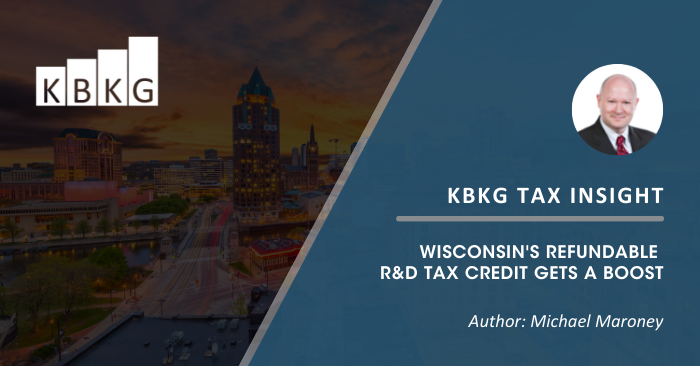Wisconsin’s Department of Revenue recently updated its Publication 131, entitled Tax Incentives for Conducting Qualified Research in Wisconsin for Taxable Years Beginning on or After January 1, 2021. It explains qualified research, eligibility and the mechanics for calculating and substantiating the credit. The most notable change to the Wisconsin credit is increasing the percentage of Wisconsin’s refundable portion of the credit from 10% to 15%.
Wisconsin qualified research expenditures (QREs)
A taxpayer’s Wisconsin qualified research expenditures (QREs) which exceed 50% of its prior three-year average QREs is multiplied by the appropriate credit rate below based on the type of research performed:
- Research Credit for Increasing Research (5.75% credit rate)
- Research Credit for Activities Related to Internal Combustion Engines (11.5% credit rate)
- Research Credit for Activities Related to Certain Energy Efficient Products (11.5% credit rate)
For taxable years beginning on or after January 1, 2021, up to 15% of a taxpayer’s Wisconsin research credit is refundable. This amount is computed by multiplying the current year’s research credit by 15%. The refundable portion is the lesser of 1) the current year research credit remaining after subtracting the amount of current year credit used to offset tax, or 2) 15% of the current year research credit.
In addition to these state credits, Wisconsin taxpayers may also claim the federal research and development (R&D) tax credit.
The QREs incurred must meet the requirements of IRC §41 (To be eligible for R&D Tax Credits, research activities must meet the criteria in the IRS Four-Part Test). The tax credits are available for expenditures related to activities occurring in Wisconsin, including:
- Wages paid to an employee performing research activities
- Wages paid to any employees directly supporting or directly supervising an employee performing research activities
- Supplies used or consumed while performing research activities
- A portion of 3rd party research performed on the taxpayer’s behalf
- Fees paid for cloud hosting dedicated to software development performed
KBKG Insight:
With the new change, Wisconsin taxpayers with R&D credits exceeding their Wisconsin tax liability could receive a larger percentage of its overall credit refunded to them, up to 15% of their total credit amount.
Wisconsin’s R&D Credit is More Valuable than Ever
Businesses in Wisconsin performing qualified research have a greater opportunity to monetize state research credits. For businesses with net operating losses, downturn in taxable income or an increase in deductible expenses (e.g., higher employer costs or plant expansion), Wisconsin’s refundable portion of its research credit is more valuable than ever.
For example, a manufacturer operating in Madison has a state tax liability of $50,000. The manufacturer generates a state research credit of $100,000. The credit would eliminate its state tax liability. Fifteen percent of the total research credit equals $15,000, which is less than the amount of credit remaining after paying the tax bill. Therefore, the taxpayer will receive a $15,000 refundable credit and carry forward the remaining $35,000 to offset Wisconsin tax in a future tax year. Wisconsin research credits carry forward for up to 15 years.
This is exciting news for companies innovating in Wisconsin, but remember, there is already a very lucrative federal credit in place, and KBKG can help qualify, quantify, document, and defend in lockstep with the recently released IRS Chief Counsel Memorandum that is changing the industry.
Questions about Wisconsin’s refundable R&D Tax Credit and how this news applies to your business? We can help. Contact us today.
About the Authors
 Michael Maroney – Director
Michael Maroney – Director
Midwest
Michael Maroney is a Director with KBKG at our Chicago, IL office. He advises clients on tax matters related to federal and state R&D tax credits. He has advised numerous Fortune 1000 clients across a variety of industries. He has successfully defended his client’s R&D claims before the IRS and state taxing authorities. He has been an instructor on these topics for numerous CPA and industry associations and has authored articles related to federal and state R&D tax credits. » Full Bio


